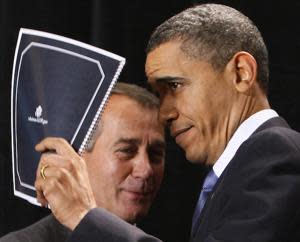 The Lookout
The LookoutCiting deficit, ratings agency downgrades U.S. credit

Despite the ongoing possibility that Congress and the Obama administration won't come to a deal to raise the U.S. debt ceiling, the major ratings agencies have so far refrained from downgrading the country's credit rating.
True, both Moody's and Standard and Poor's warned last week that they're considering doing so, thanks to the possibility that a failure to raise the debt limit could trigger a massive government default by early August. But at this point, neither has acted.
Still, neither of those two agencies has the best track record of late. Both played a key role in the events that led to the financial crisis, by continuing to slap AAA ratings on subprime-mortgage-backed securities, even long after it became clear to many that they were junk.
A less prominent agency, Egan-Jones Ratings, largely avoided buying into the subprime madness. That might be because it's not paid by the Wall Street banks whose securities it's rating; instead it collects fees from investors who need accurate assessments, so it has more of an incentive to get things right.
And wouldn't you know it? Egan-Jones announced yesterday that it had downgraded the U.S. debt rating, from AAA to AA+.
The firm made it clear that its decision wasn't prompted primarily by the immediate fear of a default caused by a failure to raise the debt limit. Rather, Egan-Jones officials explained the downgrade arose out of the related concern that Washington won't reduce the long-term deficit. "The major factor driving credit quality is the relatively high level of debt and the difficulty in significantly cutting spending," the firm said in a report released Saturday.
In an interview with The Lookout, Sean Egan, the firm's president, elaborated on that view. Egan brought up the situation of a homeowner who goes on vacation and forgets to make his monthly mortgage payment. In that case, "the mortgage company won't declare you in default," he said. "They'll charge you a fee and expect you to pay on return."
But, he continued, "it's a different case than if your ability to pay is significantly diminished."
The first scenario, he said, is how the firm views the debt ceiling issue--"akin to a delinquency that will soon be rectified." The second scenario corresponds to the long-term deficit problem, Egan said.
Egan said that since the firm first put the U.S. rating under review back in March, it had been looking for reassurance that Washington was getting the deficit problem under control. On that score, he said, "we have yet to receive comfort."
The downgrade won't have a major impact on the financial markets. But it's another sign that investors are growing increasingly spooked about the political system's apparent inability to address the country's fiscal situation.

